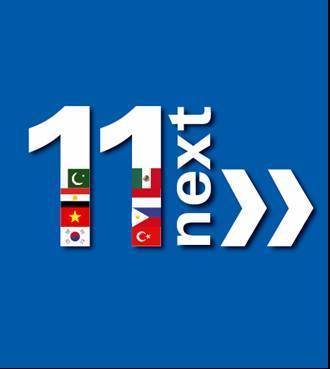2003年高盛提出的“金磚四國(guó)”概念在過(guò)去幾年深入人心,如今,這個(gè)概念已經(jīng)擴(kuò)展為五個(gè)成員國(guó)的“金磚國(guó)家”。其實(shí),他們?cè)?005年底又提出了一個(gè)“新鉆十一國(guó)”的概念,你聽(tīng)說(shuō)過(guò)嗎?

The Next Eleven (known also by the numeronym N-11) are the eleven countries – Bangladesh, Egypt, Indonesia, Iran, Mexico, Nigeria, Pakistan, the Philippines, Turkey, South Korea, and Vietnam – identified by Goldman Sachs investment bank and economist Jim O'Neill in a research paper as having a high potential of becoming, along with the BRICs, the world's largest economies in the 21st century. The bank chose these states, all with promising outlooks for investment and future growth, on December 12, 2005. At the end of 2011, the four major countries (Mexico, Indonesia, South Korea and Turkey), also known as MIKT, made up 73 percent of all Next Eleven GDP. BRIC GDP was $13.5 trillion, while MIKT GDP at almost 30 percent of that: $3.9 trillion.
Next Eleven(縮寫(xiě)為N-11,新鉆十一國(guó))指孟加拉國(guó)、埃及、印度尼西亞、伊朗、墨西哥、尼日利亞、巴基斯坦、菲律賓、土耳其、韓國(guó)以及越南等十一個(gè)國(guó)家,高盛投資銀行經(jīng)濟(jì)學(xué)家吉姆?奧尼爾在一篇研究論文中將這十一個(gè)國(guó)家與“金磚四國(guó)”并列為二十一世紀(jì)全球最大經(jīng)濟(jì)體國(guó)家。高盛銀行在2005年12月12日將這些國(guó)家選為“新鉆十一國(guó)”,每個(gè)國(guó)家都有良好的投資和增長(zhǎng)前景。到2011年底,其中的四個(gè)主要國(guó)家(墨西哥、印度尼西亞、韓國(guó)和土耳其)的國(guó)內(nèi)生產(chǎn)總值(GDP)占所有十一國(guó)的73%。“金磚四國(guó)”的GDP為13.5萬(wàn)億美元,而上述四國(guó)的GDP約占其30%,為3.9萬(wàn)億美元。
The criteria that Goldman Sachs used were macroeconomic stability, political maturity, openness of trade and investment policies, and the quality of education. The N-11 paper is a follow-up to the bank's 2003 paper on the four emerging "BRIC" economies, Brazil, Russia, India, and China.
高盛銀行在選擇這些國(guó)家時(shí)采用的標(biāo)準(zhǔn)有:宏觀經(jīng)濟(jì)穩(wěn)定程度,政治成熟度,貿(mào)易及投資政策開(kāi)放程度,以及教育質(zhì)量。這篇有關(guān)“新鉆十一國(guó)”的論文是2003年“金磚四國(guó)”(巴西、俄羅斯、印度、中國(guó))論文的后續(xù)篇。
相關(guān)閱讀
26個(gè)有意思的英語(yǔ)經(jīng)濟(jì)名詞
(中國(guó)日?qǐng)?bào)網(wǎng)英語(yǔ)點(diǎn)津 Helen)
